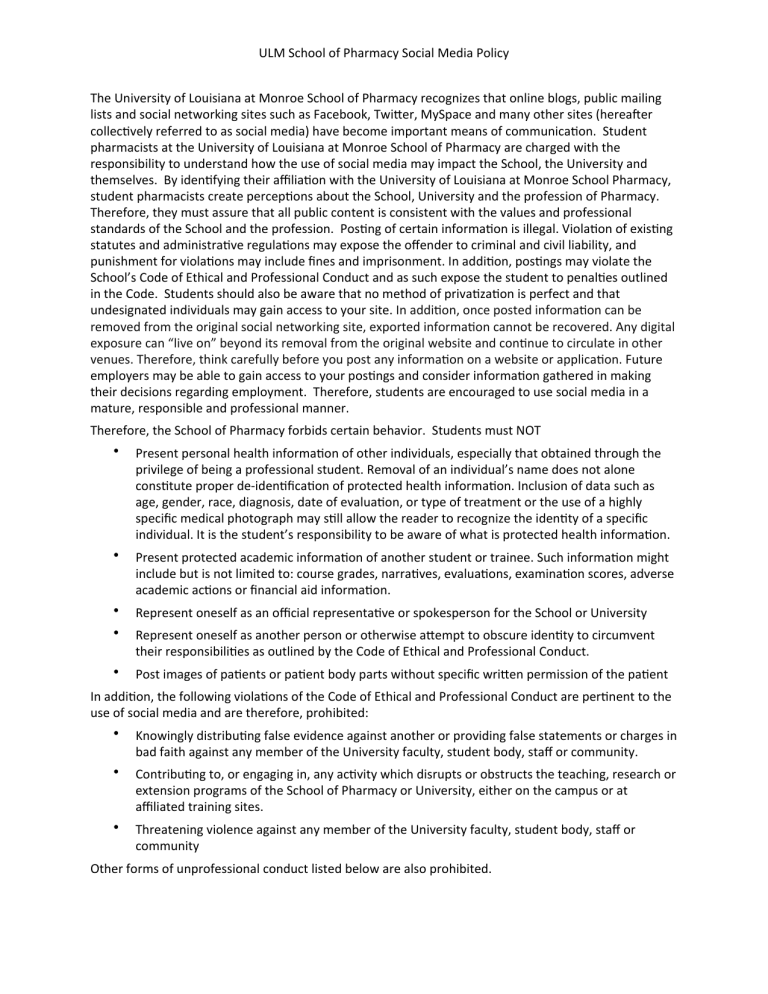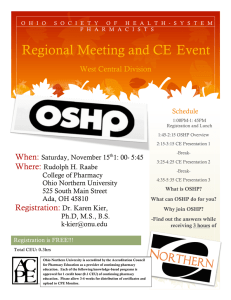Document 12064249

ULM School of Pharmacy Social Media Policy
The University of Louisiana at Monroe School of Pharmacy recognizes that online blogs, public mailing lists and social networking sites such as Facebook, TwiAer, MySpace and many other sites (hereaCer collecDvely referred to as social media) have become important means of communicaDon. Student pharmacists at the University of Louisiana at Monroe School of Pharmacy are charged with the responsibility to understand how the use of social media may impact the School, the University and themselves. By idenDfying their affiliaDon with the University of Louisiana at Monroe School Pharmacy, student pharmacists create percepDons about the School, University and the profession of Pharmacy.
Therefore, they must assure that all public content is consistent with the values and professional standards of the School and the profession. PosDng of certain informaDon is illegal. ViolaDon of exisDng statutes and administraDve regulaDons may expose the offender to criminal and civil liability, and punishment for violaDons may include fines and imprisonment. In addiDon, posDngs may violate the
School’s Code of Ethical and Professional Conduct and as such expose the student to penalDes outlined in the Code. Students should also be aware that no method of privaDzaDon is perfect and that undesignated individuals may gain access to your site. In addiDon, once posted informaDon can be removed from the original social networking site, exported informaDon cannot be recovered. Any digital exposure can “live on” beyond its removal from the original website and conDnue to circulate in other venues. Therefore, think carefully before you post any informaDon on a website or applicaDon.
Future employers may be able to gain access to your posDngs and consider informaDon gathered in making their decisions regarding employment. Therefore, students are encouraged to use social media in a mature, responsible and professional manner.
Therefore, the School of Pharmacy forbids certain behavior. Students must NOT
• Present personal health informaDon of other individuals, especially that obtained through the privilege of being a professional student. Removal of an individual’s name does not alone consDtute proper de-‐idenDficaDon of protected health informaDon. Inclusion of data such as age, gender, race, diagnosis, date of evaluaDon, or type of treatment or the use of a highly specific medical photograph may sDll allow the reader to recognize the idenDty of a specific individual. It is the student’s responsibility to be aware of what is protected health informaDon.
• Present protected academic informaDon of another student or trainee. Such informaDon might include but is not limited to: course grades, narraDves, evaluaDons, examinaDon scores, adverse academic acDons or financial aid informaDon.
• Represent oneself as an official representaDve or spokesperson for the School or University
• Represent oneself as another person or otherwise aAempt to obscure idenDty to circumvent their responsibiliDes as outlined by the Code of Ethical and Professional Conduct.
• Post images of paDents or paDent body parts without specific wriAen permission of the paDent
In addiDon, the following violaDons of the Code of Ethical and Professional Conduct are perDnent to the use of social media and are therefore, prohibited:
• Knowingly distribuDng false evidence against another or providing false statements or charges in bad faith against any member of the University faculty, student body, staff or community.
• ContribuDng to, or engaging in, any acDvity which disrupts or obstructs the teaching, research or extension programs of the School of Pharmacy or University, either on the campus or at affiliated training sites.
• Threatening violence against any member of the University faculty, student body, staff or community
Other forms of unprofessional conduct listed below are also prohibited.
ULM School of Pharmacy Social Media Policy
• DisseminaDon of electronic insults to, or verbal aAacks on, University administraDon, faculty, staff or students.
• Harassment, in any form, of University administraDon, faculty, staff or students.
• ViolaDng the confidenDality of a University or School commiAee upon which a student serves.
• Use of social media in a manner that interferes with academic responsibiliDes.
The following acDons are also strongly discouraged:
• Display of vulgar language
• Displays of any kind that imply disrespect for any individual or group because of age, race, gender, ethnicity or sexual orientaDon
• Displays of images that may reasonably be interpreted as condoning irresponsible use of alcohol, substance abuse, or sexual promiscuity
• PosDng of potenDally inflammatory or unflaAering material on another individual’s website.
• InteracDons with paDents through social media should be avoided. This provides numerous opportuniDes for violaDng privacy restricDons and may have legal consequences.
The following acDons are considered “best pracDces” and are strongly encouraged:
• Students should use privacy se^ngs to limit the unknown or unwanted access to the student’s profile or applicaDon.
• Due to frequent updaDng of social media sites, it is advisable that students regularly check their privacy se^ngs to opDmize their privacy and security.
• Students should consider minimizing personal informaDon on social media profiles. It is suggested students not include addresses, phone numbers, social security numbers, PID numbers, passport numbers, driver’s license numbers, birth dates or any other informaDon that could be used to obtain personal records.
• If students choose to list an email address on a social networking site, students should use a personal email address (not a ulm.edu address) as the primary means of idenDficaDon.
In addiDon to the above personal recommendaDons all student organizaDons and School of pharmacy class social media sites must abide by the ULM social media policy found at: hAps:// webservices.ulm.edu/policies/index.php?a=details&i=2561&backa=search&backs=Socail%20Media
References :
1. The University of Mississippi, School of Pharmacy, Student Handbook, 2012-‐2013, www.pharmacy.olemiss.edu/handbook2012.pdf
2. University of California, San Diego, Skaggs School of Pharmacy and PharmaceuDcal Sciences,
Guidelines and Best PracDces for Online Social Media Use by Student Pharmacists pharmacy.ucsd.edu/current/pdf/Social_Media_Guidelines.pdf
3. School of Pharmacy, University of Florida, Social Networking Policy hAp://www.cop.ufl.edu/ educaDon/student-‐affairs/policies/social-‐networking-‐policy/
4. UAMS School Pharmacy, Student Handbook, 2012, available at hAp://pharmSchool.uams.edu/ updates




